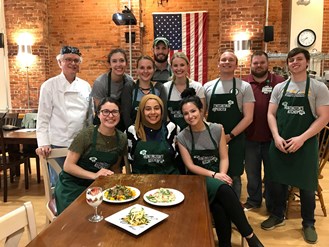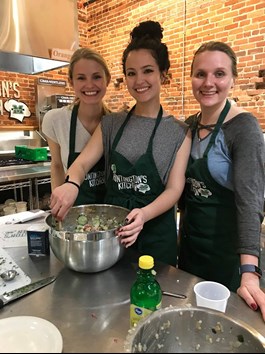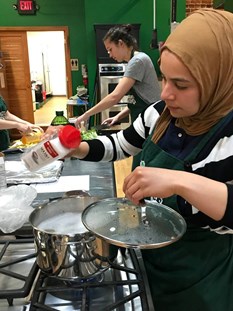Culinary medicine for Marshall’s Medical Students at Huntington’s Kitchen: An engaging, experiential way to learn about nutrition
BLOG / By Dr. N. Andrew Vaughan
 This evening, Chef Marty Emerson of Huntington’s Kitchen and I had a wonderful opportunity to introduce a group of nine medical students to the idea that learning nutritional concepts and principles can be a fun and engaging activity. You don’t have to be a Food Network star or even really have expert culinary skills. If you can chop and oven-roast a few vegetables, boil water or simmer a sauce, you can have a great evening of engagement with your fellow students and learn some serious nutritional concepts—all with the idea of learning the knowledge and skills to counsel patients about diet and nutrition.
This evening, Chef Marty Emerson of Huntington’s Kitchen and I had a wonderful opportunity to introduce a group of nine medical students to the idea that learning nutritional concepts and principles can be a fun and engaging activity. You don’t have to be a Food Network star or even really have expert culinary skills. If you can chop and oven-roast a few vegetables, boil water or simmer a sauce, you can have a great evening of engagement with your fellow students and learn some serious nutritional concepts—all with the idea of learning the knowledge and skills to counsel patients about diet and nutrition.
The discipline of culinary medicine has actually been around for quite a while. An announcement in the British Medical Journal in January 1893 (yes, that’s 1893!) actually described an opportunity for medical trainees to participate in a demonstration course of what was termed in those days as “sick room and convalescent cookery.” Well, we’ve come a long way since then in understanding nutrition and its fundamental role in the prevention and treatment of many of the illnesses we see in the clinic and the hospital every day.
 After an introductory slide show about culinary medicine, I presented the fundamental concepts of a Mediterranean-style diet, with the background history and cultural aspects of what the United Nations Educational, Scientific and Cultural Organization (UNESCO) has deemed an “intangible cultural heritage of humanity.”
After an introductory slide show about culinary medicine, I presented the fundamental concepts of a Mediterranean-style diet, with the background history and cultural aspects of what the United Nations Educational, Scientific and Cultural Organization (UNESCO) has deemed an “intangible cultural heritage of humanity.”
The group was divided into teams for a case study and questions to research while Chef Marty got items assembled at the cook stations. We then proceeded to cook stations with Chef Marty for a review of the recipes to prepare for the evening. All of these recipes provided examples of fundamental Mediterranean nutrition principles with whole grains, fresh vegetables, herbs, spices and olive oil.
After some preparation of vegetables—dicing onions, peeling, chopping and roasting butternut squash, sautéing tomatoes with garlic and basil, boiling cous cous and barley, and preparing vinaigrettes—dishes really starting coming together as final seasoning touches were added to each and show plates prepared for all to see.
 Then, we all sat down family style around a large table in the Kitchen and sampled each dish as each team discussed their preparation and nutritional aspects. We also reviewed the case study and questions to complete the educational objectives for the evening. And to top it all off, Chef Marty prepared a special dessert of low fat Greek yogurt, fresh berries and granola.
Then, we all sat down family style around a large table in the Kitchen and sampled each dish as each team discussed their preparation and nutritional aspects. We also reviewed the case study and questions to complete the educational objectives for the evening. And to top it all off, Chef Marty prepared a special dessert of low fat Greek yogurt, fresh berries and granola.
The idea of having medical students learn about nutrition in this manner has taken off nationwide. Studies have shown that students not only become more comfortable in discussing nutrition with their patients but actually change their own dietary selections to more dark green vegetables and other healthy choices.
As Dr. David Eisenberg of the Harvard T.H. Chan School of Public Health stated, “If we can teach medical students how to hold a knife and cook a healthy, delicious, affordable meal themselves, I think it changes the way they view a discussion of diet, food, nutritional habits, and nutrition assessment for patients.”
A recent study published in the Journal of the American Medical Association (JAMA) indicated that in 2012, 45% of the deaths in the U.S. due to cardiometabolic diseases were directly related to poor diet. Training opportunities like this in the kitchen set the stage for our future physicians to effectively begin a conversation with their patients about nutrition.
For more information about how one medical school has introduced and developed such a program, access this YouTube video: https://www.youtube.com/watch?v=igT6VadRfbs.
Andrew Vaughan, MD, MBA, CCMS, is a board-certified, fellowship-trained cardiologist with Marshall Health and an assistant professor in the department of cardiovascular services at the Marshall University Joan C. Edwards School of Medicine. He is a Certified Culinary Medicine Specialist and places a special emphasis on nutrition as it relates to heart disease and heart health when talking with his patients.
Date Posted: Tuesday, April 16, 2019



